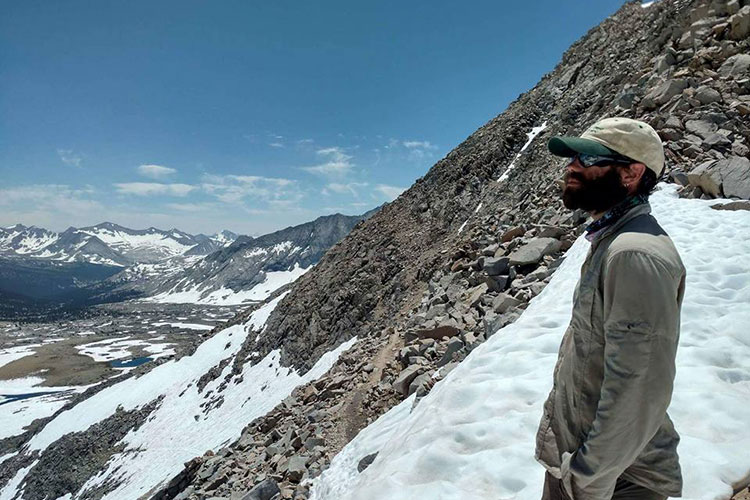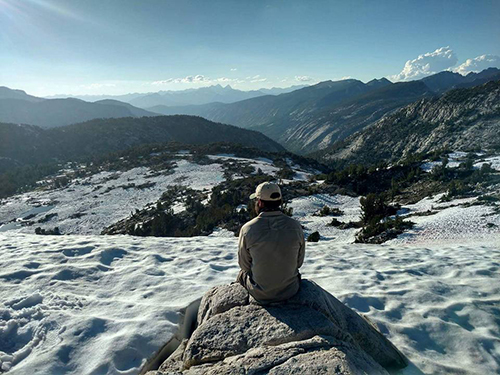
Jet Garner takes in the view at Glen Pass in the Sierra Nevada. (Photo courtesy of Jet Garner)
As Almost Sunrise, a film about two veterans who trek across America, heads to campus for Veterans Day, Berkeley alumnus and military veteran Jeremy “Jet” Garner talked with Berkeley News about his own hike earlier this year on the Pacific Coast Trail, or PCT. It spans more than 2,600 miles, from Mexico to Canada through California, Oregon and Washington.
After five years in the Marine Corps and another five in college, where he double-majored in political economy and Mandarin Chinese, Garner says he needed to “clear his head.” He recalls his approximately four-month adventure as dangerous, beautiful, amazing and hilarious, and adds that it taught him about “trying to let things go.”
When and where did you begin and end your trek?
I started in Campo, California, right on the Mexico-U.S. border, five days after I graduated, last May 19. I ended at White’s Pass in Washington in early September after renting a car and driving with a hiking partner from South Lake Tahoe in an attempt to beat winter up north. I had hiked from Campo to South Lake Tahoe straight through, about 1,100 miles. Between Oregon and Washington, I’d hiked about another 150. My total miles walked was around 1,250 to 1,300.
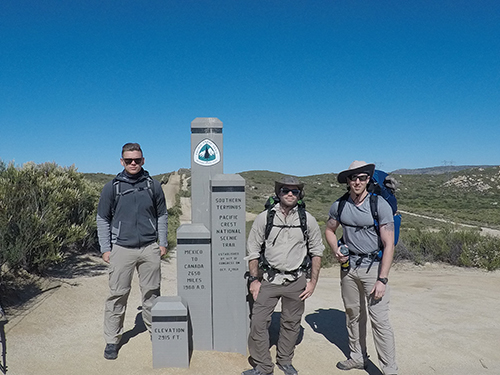
Garner (center) and fellow hikers with the trail names of Warm Bananas (left) and Bigfoot about to start hiking the Pacific Coast Trail. (Photo courtesy of Jet Garner)
Why did you decide to hike the Pacific Coast Trail?
My final semester at Cal had me questioning seven years of plans to be an entrepreneur and own my own brewery. Instead, I was looking into working as a diplomat in the United Nations to better international political economic conditions. Neither is a bad road, but I felt I needed to clear my head without anyone else “inside” of it for a while. Five years of military institutionalization followed by five years of academic institutionalization also had left me incredibly confused about who “I” actually was. So, I dumped my girlfriend, let my lease go, ignored immediate career opportunities, and did the PCT for myself. Not for anyone else but me.
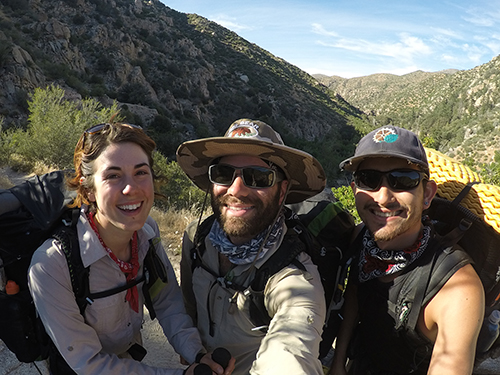
Garner (center) and friends Lucky Feet (left) and Craigslist just before arriving at Deep Creek Hot Springs in the Northern Mojave Desert. (Photo courtesy of Jet Garner)
Did you hike alone?
I started the hike with two people – one I knew from school and one I did not. One stopped hiking after seven days, the second after about 14. I was by myself from the 200-mile marker, but I did try to attach to others so I wasn’t totally alone. The level of comradery that develops with your fellow hikers on a trail like the PCT is akin to combat friends. Bonds are created through shared hardship as well as irreplaceable memories. The other military veterans I met and I agreed that hiking the PCT as a veteran is like being in the field without rank, weapons, uniforms. It kind of embodies everything we loved about the military with very few of the drawbacks.
What were a few of the biggest challenges you faced along the way?
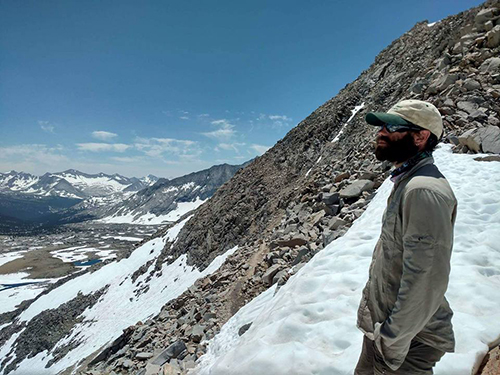
Garner at Glen Pass. (Photo courtesy of Jet Garner)
When my second friend left me in the desert, I was all alone. I hiked all night to catch up with a few friends that were about 10 miles ahead of me. It wasn’t a good night to hike. I was harassed by coyotes, the trail wasn’t well marked, and I got lost frequently, I was dead tired and ended up hurting my left ankle and right calf along the way.
I also made a poor decision that nearly got me killed. Passing through Yosemite Valley, I was alone, and I failed to cross a log over a river, slipped on it, bashed my shin hard against it and fell into the river. Two other hikers had died nearly the same way while some of us were hiking the Sierras. Tumbling through the rapids, bouncing off rocks and the river bed, I was pretty sure I likely was about to join them. I managed to get my bearings and swim to the other side. I limped alone the next 40 miles or so over a day and a half to the next town. I got a bit bitter during those days and struggled to enjoy the trail anymore.
What insights did you gain from your time on the trail?
I learned a lot about trying to let things go. Why be mad? Why bother getting upset about something? Why do you just not like a particular person? Why aren’t you enjoying a particularly beautiful sight when everyone else is enjoying it? I felt like I worked through most of these questions for the better.
People also gain from each other purely though the amount of talk and shared experiences on this trail. Sometimes, you will be in constant conversation for nearly six to eight hours a day just hiking with one or two individuals. You learn everything about each other. The level of insight and perspective is phenomenal.
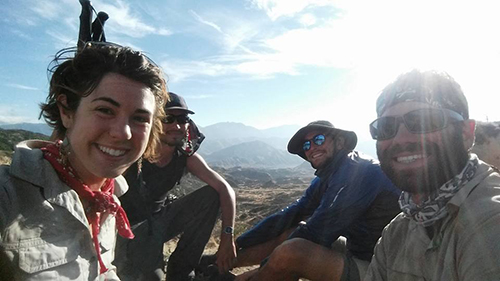
Garner (right) and PCT pals Lucky Feet (left), Craigslist and Philippides at Cajon Pass in the Southern California desert around mile 400. (Photo courtesy of Jet Garner)
But I also realized I couldn’t enjoy some of the more beautiful things on the trail that other people noticed because these wide open, beautiful expanses reminded me of being in Afghanistan. Seeing mountains, climbing mountains, association with pain from hiking. I connected those to combat, and it was preventing me from living in the moment. I was having pretty much a PTSD episode, and I believe this type of scenario in the outdoors could limit healing from PTSD. My level of exhaustion, pain, and loneliness wasn’t helping my PTSD, it triggered it.
You stopped hiking before the PCT ended. Why?
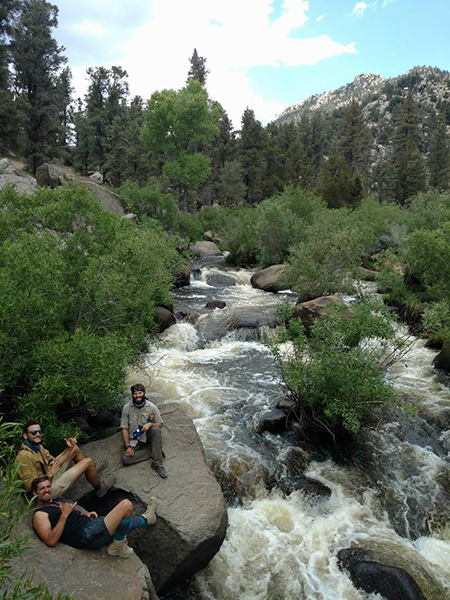
Garner (center), Philippides (left) and Bogtrodder, rest by a river on their first day in the Sierra. (Photo courtesy of Jet Garner)
I knew I was done because I had begun chasing job opportunities that had risen to the surface, and I also was fed up with negotiating the hostile weather conditions. I was run off of trail by fire about three times trying to finish the Pacific Northwest. There was freezing rain and hail plaguing Northern California, and I was enjoying just spending time with a hiking partner having off trail adventures. All of that combined, I felt myself missing “real life” and wanted to return to it for a while. But I regret nothing. I did love it, and I will one day go back and finish the PCT, now as a seasoned backpacker.
NOTE: Garner was featured in a 2016 Berkeley News story and video about two dozen UC Berkeley student veterans whose psychological and physiological response to the awesomeness of nature is being studied as part of a multi-year UC Berkeley research project.
